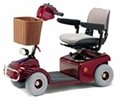
Home Care for the Elderly:
What's the Right Fit for My Elderly Parent?
Home care for the elderly can allow seniors to "age in community" and continue living in their own home.
It can be a much better option than moving to a senior living community.
When we discuss home care services, we will be discussing paid services through either a public or private agency.
There is, of course, also home care from friends or family; but in this case we'll be looking at paid services.
Services available can include assistance with personal care, bathing assistance, grocery shopping, meal preparation, housecleaning, laundry and more.
Some of these services might be provided through public health care and some might have to be paid for privately, depending on your health region.
What Home Care Services are Available?
Home care for the elderly takes place in the seniors home and is a customized group of services designed to meet the needs of the client.
1) Personal Care Assistance: Can include assistance with dressing, grooming and toileting.
2) Medication Management: Includes reminding seniors to take their medication.
3) Bathing Assistance: Assistance with showering or bathing. Most home care providers require a properly set-up bathroom to protect their backs from injury. Depending on the bathroom design, it can include a tub transfer bench with a hand held shower head.
4) Grocery Shopping: Includes picking up, delivery and putting away of groceries.
5) Meal Preparation: Can include making a sandwich or soup, chopping vegetables, fruits, cooking and baking.
6) Laundry: Includes doing laundry, folding and putting away clothes.
7) Running Errands: Includes running errands on behalf of the senior or taking the senior on errand trips.
8) Transportation: Includes driving senior to medical appointments, shopping, etc.
9) Respite Care: Includes having someone stay with the senior and provide the required care during that time so that the usual caregiver (typically a family member) can have a break, run errands, etc.
10) Palliative Care: Includes most of the above services but specially designed for individuals at the end of life.
11) Post-operative Care: Includes most of the above services but for a specific block of time (12-24 hours) - when the senior needs assistance the most.
Whether any or all of these home care for the elderly services are covered through your public health program depends on each program.
Process
The process typically involves a nurse completing a care assessment with the senior (and usually their family).
This includes medical history, social supports, abilities (bathing, dressing, grooming), needs and financial information (if government funded program available).
The senior (and family) and the nurse agree upon a care plan. This can be adjusted as time goes on and ability/needs change.
Care aides are then scheduled and provide services agreed upon. Nurses monitor the implementation of the care plan and make adjustments as needed.
How Much Does It Cost?
Depending on where the senior resides, the senior may be eligible for government funded home care for the elderly programs. If not, they will have to pay out of pocket, have their insurance company pay or a combination.
It also depends on the type of service provided. For instance, bathing might be a publicly funded service but transportation to appointments or making meals might not be funded.
Some government funded programs are on a sliding scale based on income. They typically have a per diem cap as well.
Private pay home care services can cost anywhere from $12 to $50 a visit depending on the length of time and services provided. Bundled services are typically more affordable as the care aide can provide a number of services in one visit.
Senior living remotely may have to pay travel costs for services.
To get some ideas about ways to combine public and private services, see the section "Combining Formal and Informal Supports" in our article Caregiver for Elderly.
Benefits
The main benefit of home care for the elderly is that the senior can safely remain living in their own home. Family members also gain peace of mind as they feel their loved ones are safe.
Although home care can seem expensive, costs for senior living communities is also high. It is typically more affordable to pay for home care services than move. It is best to compare options before deciding.
The added benefit is the senior's health is being monitored on a fairly regular basis. Medication can be managed and risks are reduced (falling in shower, etc.).
Things To Think About
Seniors (and their family members) need to review references and make sure the home care service for the elderly provider has a good reputation. Ask friends and family for recommendations. Ask the business for references.
Prices may differ but quality is important. A good home care company will likely cost more but their employees and service will be better. You want caring, professional care aides and nurses working with your aging parents.
Return to Caring for Aging Parents






New! Comments
Have your say about what you just read! Leave me a comment in the box below.